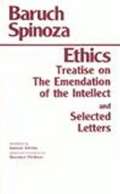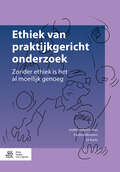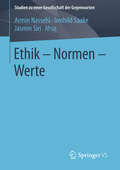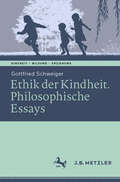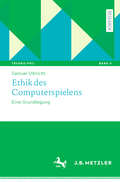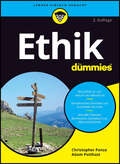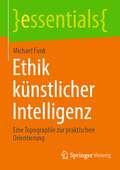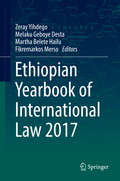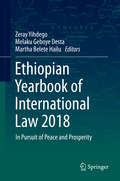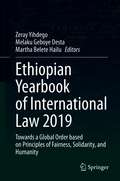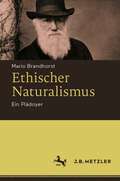- Table View
- List View
Ethics: With the Treatise on the Emendation of the Intellect, and Selected Letters
by Benedictus De SpinozaSince their publications in 1982, Samuel Shirley's translations of Spinoza's Ethics and Selected Letters have been commended for their accuracy and readability. Now with the addition of his new translation of Treatise on the Emendation of the Intellect this enlarged edition will be even more useful to students of Spinoza's thought. Foreward by Seymour Feldman.
Ethics: with The Treatise on the Emendation of the Intellect and Selected Letters
by Baruch Spinoza Seymour Feldman Samuel ShirleySince their publication in 1982, Samuel Shirley's translations of Spinoza's Ethics and Selected Letters have been commended for their accuracy and readability. Now with the addition of his new translation of Treatise on the Emendation of the Intellect this enlarged edition will be even more useful to students of Spinoza's thought.
Ethiek van praktijkgericht onderzoek: Zonder Ethiek Is Het Al Moeilijk Genoeg
by Eveline Wouters Sil AartsDit boek heeft als doel onderzoekers in de praktijk, en met name begeleiders van onderzoek in de praktijk op het hbo en daarbuiten, een handreiking te bieden om ethische dilemma’s waar te nemen en bespreekbaar te maken. Onderzoek in de praktijk is al lastig op zich, het goed herkennen, omgaan met en begeleiden van situaties die ethische vragen oproepen, die gaan over wat goed, wenselijk en verantwoord onderzoek is, maken het onderzoek nog lastiger. Aan de hand van verschillende fases van het onderzoek (vanaf het eerste idee tot en met de rapportage) worden verschillende ethische vraagstukken besproken. Deze vraagstukken gaan vaak over de afweging hoe het belang van de (individuele) deelnemer opweegt tegen het belang van de kennisontwikkeling door middel va het onderzoek of het belang van de onderzoeker. Maar ook: wat te doen met vertrouwelijke informatie, of de wensen van de opdrachtgever, hoe de resultaten eerlijk gepresenteerd kunnen worden en vele andere vraagstukken. Deze worden alle geïllustreerd met voorbeelden uit de praktijk. Daarnaast wordt specifiek ingegaan op dilemma’s rondom beoordelen van (afstudeer)werk, de nieuwe technologische mogelijkheden van dataverzameling (big data), en de wet- en regelgeving.
Ethik - Normen - Werte
by Armin Nassehi Irmhild Saake Jasmin SiriWährend philosophische Theorien üblicherweise die Inkonsistenzen eines modernen Werte-Pluralismus mit neuen ethischen Konzepten heilen wollen, interessiert sich die soziologische Systemtheorie für die schlichte Beobachtung moralischer und ethischer Kommunikation. In den Blick rücken dabei praktische Situationen, in denen ethische Konzepte, moralische Subjekte, normative Ansprüche und Werte entstehen und anschlussfähig werden. Dieser Band versammelt empirische Studien zu so unterschiedlichen Kontexten wie Krankenhäusern, Wirtschaftsorganisationen, politischen Debatten und Mode und vermittelt so einen Eindruck von den unterschiedlichen Gegenwarten einer sich moralisch beschreibenden Gesellschaft.
Ethik der Algorithmen: Auf der Suche nach Zahlen und Werten (Techno:Phil – Aktuelle Herausforderungen der Technikphilosophie #6)
by Christopher KoskaAlgorithmenethik ist ein Versuch zur Spezifikation von moralphilosophischen Fragen, die sich aus den Veränderungs- und Transformationsprozessen der Digitalisierung ergeben. Als wissenschaftliche Unternehmung zielt sie in erster Linie darauf, ethische Kriterien und Prinzipien für eine nachhaltige Wertschöpfung durch eine verantwortungsbewusste und vertrauensvolle Datennutzung zu finden und zu begründen. Ziel dieses Buches ist es, einen Beitrag zur Verortung und zum weitläufigen Entwicklungspotential einer eigenständigen Algorithmenethik zu leisten. Dabei besteht die zentrale Aufgabe darin, das Transparenz- und Kontrollproblem im Kontext von digitalen Technologien, welches sich auch als ein Kompetenz- bzw. Befähigungsproblem darstellen lässt, begrifflich zu beschreiben und einem ethischen Zugriff zugänglich zu machen, um es anschließend zu beurteilen und Gestaltungsperspektiven aufzuzeigen.
Ethik der Kindheit: Philosophische Essays (Kindheit – Bildung – Erziehung. Philosophische Perspektiven)
by Gottfried SchweigerDieses Buch versammelt Essays zur Philosophie der Kindheit. Worin besteht eine gerechte Gesellschaft für Kinder? Sind Kinder besonders verletzbar? Was schulden wir minderjährigen Flüchtlingen oder Kindern in Armut? Was ist eine gute Jugend? Die Essays in diesem Buch stellen und beantworten diese Fragen aus Sicht einer Ethik der Kindheit.
Ethik der Macht der öffentlichen Verwaltung: Zwischen Praxis und Reflexion (Geschichte und Ethik der Polizei und öffentlichen Verwaltung)
by Nanina Marika Sturm Emanuel JohnDiesem Buch liegt die These zugrunde, dass sich ein Verständnis der Macht der öffentlichen Verwaltung nicht allein auf die Befugnisse beschränkt, mit denen deren Mitarbeiter*innen ausgestattet sind. Um die verschiedenen Dimensionen der Macht der öffentlichen Verwaltung zu erkunden, werden Beiträge aus verschiedenen fachlichen Perspektiven versammelt. So soll einerseits deutlich werden, inwiefern in die Macht der öffentlichen Verwaltung auch soziale und kulturelle Faktoren einfließen. Andererseits sollen dadurch Perspektiven für eine ethische Gestaltung der alltäglichen Verwaltungspraxis freigelegt werden.
Ethik der Pandemie (essentials)
by Peter RinderleDie Corona-Krise zwingt uns zu gewaltigen Veränderungen unserer privaten Lebensführung und erfordert höchst umstrittene politische Maßnahmen zum Schutz der Gesundheit und zur Verteilung knapper Ressourcen. Sie verlangt große Anstrengungen von den Wissenschaften, und sie hat nicht zuletzt erhebliche Auswirkungen auf die kulturelle Identität von Gemeinschaften. Dieses Büchlein gibt einen Überblick über die wichtigsten Fragen und Probleme, die eine globale Pandemie für die philosophische Ethik aufwirft. Nach einer Analyse des Begriffs und des Werts der Gesundheit präsentiert und bewertet es die prominentesten Lösungsvorschläge und soll mit einer Reflexion über die Forderungen der Gerechtigkeit und die Inhalte eines guten Lebens zur Orientierung unseres persönlichen und politischen Handelns beitragen.
Ethik der mediatisierten Welt
by Matthias RathDer Band erweitert die Medienethik über Medieninhalte und Medienpraxis hinaus zur ,,Ethik der mediatisierten Welt". Er fußt dabei einerseits auf der Einsicht in die grundsätzliche Medialität des Menschen sowie die daraus folgende Prägung seiner gesellschaftlichen Realität und überbrückt andererseits die Kluft zwischen normativer Ethik und deskriptiven Kommunikations- und Medienwissenschaften. Eine Ethik der mediatisierten Welt muss dabei nicht nur die eigenen philosophischen Wurzeln bedenken, sondern die medienethischen Grundbegriffe auch interdisziplinär beherrschen. Sie wird daher als integrative Disziplin zwischen Philosophie und Kommunikations- und Medienwissenschaften verstanden.
Ethik der mediatisierten Welt: Grundlagen und Perspektiven
by Matthias RathDer Band erweitert die Medienethik über Medieninhalte und Medienpraxis hinaus zur „Ethik der mediatisierten Welt“. Er fußt dabei einerseits auf der Einsicht in die grundsätzliche Medialität des Menschen sowie die daraus folgende Prägung seiner gesellschaftlichen Realität und überbrückt andererseits die Kluft zwischen normativer Ethik und deskriptiven Kommunikations- und Medienwissenschaften. Eine Ethik der mediatisierten Welt muss dabei nicht nur die eigenen philosophischen Wurzeln bedenken, sondern die medienethischen Grundbegriffe auch interdisziplinär beherrschen. Sie wird daher als integrative Disziplin zwischen Philosophie und Kommunikations- und Medienwissenschaften verstanden.
Ethik des Computerspielens: Eine Grundlegung (Techno:Phil – Aktuelle Herausforderungen der Technikphilosophie #4)
by Samuel UlbrichtTrotz der steigenden Zahl an Computerspielern weltweit markiert die moralische Einordnung von Computerspielhandlungen ein bislang ungelöstes Rätsel der philosophischen Ethik. Angesichts der Brisanz der Thematik im Alltag (zu sehen an der ‚Killerspiel-Debatte‘) ist augenfällig, dass es einer differenzierten fachlichen Klärung des Phänomens bedarf: Kann das Spielen von Computerspielen unmoralisch sein? Zur Beantwortung dieser Frage erörtert der Autor zunächst, was wir überhaupt tun, wenn wir Computerspiele spielen: Über welche Art von Handlung sprechen wir? Im zweiten Schritt erfolgt eine moralische Einordnung, die erschließt, ob (und wenn ja, warum) manche Computerspielhandlungen moralisch problematisch sind. Die hier angestellten Überlegungen gewähren einen grundlegenden Einblick in die normative Dimension des Computerspielens.Samuel Ulbricht hat in Stuttgart Philosophie und Deutsch auf Lehramt studiert und dort sein erstes Staatsexamen mit Auszeichnung absolviert. Für seine Abschlussarbeit zur Ethik des Computerspielens erhielt er den „Preis der Freunde der Universität Stuttgart“. Aktuelle Forschungsschwerpunkte sind normative Unterschiede der Moraltheorien, Problembereiche der angewandten Ethik sowie die Ästhetik und Ethik des Computerspielens. Derzeit unterrichtet er die Fächer Deutsch und Ethik am Liselotte-Gymnasium in Mannheim.
Ethik für Dummies (Für Dummies)
by Christopher Panza Adam PotthastWas ist richtig und was ist falsch? Wer entscheidet das, und warum ist die Antwort auf diese Frage oft so schwer zu finden? Fragen wie diese beschäftigen wohl jeden irgendwann einmal. Christopher Panza und Adam Potthast helfen Ihnen, sich den oft furchtbar komplizierten Antworten darauf zu nähern. Sie erläutern Ihnen die häufig schwer verständlichen Schriften von Kant, Hobbes und Co., erklären, wie sich Wissenschaft und Religion zur Ethik verhalten und vieles mehr. Darüber hinaus diskutieren sie Themen wie biomedizinische Ethik oder Umweltschutz, die aktuell die Öffentlichkeit bewegen. So ist dieses Buch der perfekte Begleiter für Sie, wenn Sie sich systematisch mit ethischen Fragen beschäftigen wollen.
Ethik in den Wissenschaften: Einblicke und Ausblicke (Ethik – Mensch - Technik)
by Karen JoistenDas vorliegende Buch gewährt Einblicke und Ausblicke in unterschiedliche Disziplinen der Wissenschaft und die mit ihnen einhergehenden ethischen Probleme und Fragestellungen. Das Buch richtet sich neben dem akademischen Fachpublikum vor allem auch an ein breiteres Publikum, da Ethik nur nachhaltig sein kann, wenn auch die breite Bevölkerung sich kompetent und engagiert ethischen Problemen und Fragen stellt und in den Diskurs einbringt.Die Themen, die in diesem Band diskutiert werden, beziehen sich auf: Ethos und Pathos der Architektur, ethische Aspekte des Regierens, die Digitale Transformation, eine philosophische Unterscheidung von Roboter und Mensch, Grenzen der Medizin, ethische Kriterien der Technikfolgenabschätzung, ethische Entscheidungen im Nachhaltigkeitsmanagement und eine juristische Sicht auf Nachhaltigkeit und Umweltgerechtigkeit.
Ethik in der Apotheke: Wissen, Vertrauen und Kommunikation im Kontext der Pharmazie (essentials)
by Rainer HeideDieses Buch ist ein Plädoyer dafür, dass Pharmazeuten sich mit der moralischen Bewertung ihres Handelns beschäftigen sollten. Der Pharmazeut wird als Kaufmann, selbst bei ethisch und moralisch gutem Handeln, immer anders agieren (müssen) als der Heilberufler, da bei Letzterem allein die selbstlose fachliche Hilfe als Primat des Handelns angenommen wird. Rainer Heide gibt in diesem essential Denkanstöße und Handlungsempfehlungen im interpersonellen Kontext der öffentlichen und Klinikapotheke. Der Autor: Dipl. Biol. Rainer Heide, Pharmazeut, Schwerpunkte seiner Arbeit sind geriatrische Pharmazie und Ethik in der Pharmazie. Rainer Heide lehrt als Honorardozent in der pflegerischen Ausbildung am Klinikum der Universität Jena und an verschiedenen Weiterbildungseinrichtungen. Er ist Mitglied in der Deutschen Gesellschaft für Geriatrie, dem Arbeitskreis „Reduktion freiheitsentziehender Maßnahmen in der Pflege“ der Stadt Jena und Vorstand des Jenaer Demenz Informations- und Beratungsverein JeDI e.V.
Ethik künstlicher Intelligenz: Eine Topographie zur praktischen Orientierung (essentials)
by Michael FunkKünstliche Intelligenz ist zum vielschichtigen Gegenstand ethischer Debatten geworden. Ob Richtlinien fairer Digitalisierung und vertrauenswürdiger Algorithmen, Gestaltung nachhaltiger Geschäftsmodelle, informatische Grundbildung in Schulen oder Existenzfragen freiheitlich-demokratischer Gesellschaften – KI-Ethik steht vor komplexen Herausforderungen. Grundsätzlicher Klärungsbedarf entsteht durch die verschiedenen Zugänge, Interessen und Begrifflichkeiten, die aufeinandertreffen. Vorliegendes essential präsentiert auf zugängliche Weise wissenschaftliches Überblickswissen zur KI-Ethik. Als praktische Orientierungshilfe im komplexen Terrain dient eine thematische Topographie, einschließlich zentraler Begriffe. Zusammenhänge zwischen Industrie 5.0, Regulierung, Post- und Transhumanismus, selbstfahrenden Autos, moralischen Maschinen, nachhaltiger Digitalisierung oder dem Anthropozän werden mit Blick auf KI-Ethik systematisch sichtbar gemacht.
Ethik und Wirtschaft
by Peter BendixenEthik ist ein sehr altes Thema. Doch die Verbindung mit der Wirtschaft ist noch frisch und unausgereift. Es gibt reale Gründe für die Aktualität dieser Fragestellung, und zugleich gibt es Zweifel, ob wir - namentlich die Ökonomen - die richtigen Ansätze zur Wirtschaftsethik gefunden haben. Zu viele Experten haben sich in ihrem eigenen Fachdenken eingeigelt und weisen Gedanken, die neue Wege auftun wollen, ihre stachelige Seite. Meine Grundthese in dieser Schrift lautet: Die Ethik des praktischen Wirtschaftens muss nicht erst erfunden werden, sondern kann als Lehre von der moralischen Kraft aus den elementaren Komponenten des praktischen Wirtschaftens herausdestilliert und zur Sprache gebracht werden.
Ethik-Cafés im Sozial- und Gesundheitswesen: Sich über aktuelle Lebensfragen ethisch verständigen und austauschen
by Manfred Baumann Carola FrommSeit über zehn Jahren moderieren die Autor*innen mit hohem Zuspruch das Ethik-Café in Einrichtungen des Sozial- und Gesundheitswesens. Menschen aus unterschiedlichen Berufen, Patient*innen, An- und Zugehörige sowie ethisch Interessierte haben im Ethik-Café die Möglichkeit, aus ihrer persönlichen und beruflichen Perspektive ethische Fragestellungen zu diskutieren, die für ihren Alltag relevant sind. Ethik-Cafés sind niederschwellig, multiprofessionell, interdisziplinär. Die Teilnehmer*innen profitieren von dieser Perspektivenvielfalt. Das Buch stellt die Konzeption sowie deren Evaluation, die theoretischen und methodischen Voraussetzungen und in vielen Beispielen die praktische Umsetzung von Ethik-Cafés dar. Das entwickelte Vier-Phasen-Modell des ethischen Prozesses wird exemplarisch in 25 Ethik-Cafés zu Themen aus dem Sozial- und Gesundheitswesen angewendet und umgesetzt. Das Buch richtet sich an Mitarbeiter*innen und Führungskräfte im Sozial- und Gesundheitswesen, Lehrer*innen, Lernbegleiter*innen und Auszubildende in der generalistischen Pflegeausbildung, an Fort- und Weiterbildungsreferent*innen, Studierende, Ehrenamtliche sowie alle ethisch Interessierten.
Ethikberatung in der Medizin
by Florian Bruns Arnd T. May Andreas FrewerIn den letzten Jahren hat sich eine Vielfalt unterschiedlicher Gremien zur Ethikberatung entwickelt: vom Konsil mit einem einzelnen Berater bis zum Ethikkomitee. In dem Band werden die Ethikberatung, ihre Entwicklung und Anwendung, sowie die Gründung von Gremien in Krankenhäusern, Pflegeeinrichtungen, Hospizen und von niedergelassenen Ärzten anhand von Fallbeispielen erläutert. Dabei schlagen die Autoren eine Brücke zwischen traditioneller philosophischer Ethik und anwendungsbezogener klinischer Ethik. Auch rechtliche Fragen werden erörtert.
Ethiopian Yearbook of International Law 2017 (Ethiopian Yearbook of International Law #2017)
by Zeray Yihdego Melaku Geboye Desta Fikremarkos Merso Martha Belete HailuThe second volume of EtYIL brings together a number of articles and other contributions that, collectively, take EtYIL’s original mission of helping rebalance the narrative of international law another step forward. Like the first volume, this book presents scholarly contributions on cutting-edge issues of international law that are of particular interest to Ethiopia and its sub-region, as well as Africa and developing countries more generally. The major issues tackled include the interplay between national and international in the promotion and regulation of foreign direct investment in Ethiopia; the regulatory framework for the exploitation and development of petroleum resources and relevant arbitral jurisprudence in the field; the role of international law in ensuring the equitable sharing of transboundary resources, such as the waters of the River Nile, or in the delimitation of the continental shelf in the region; the efforts to establish the Continental Free Trade Area in Africa and the lessons that can be learnt from prior experiments; Africa’s policy towards the International Criminal Court and the feasibility of alternative means of serving justice in the case of grave crimes; and the UN’s peace-keeping operations in their North-South context. The issues addressed in the various contributions are mostly at the heart of live political, diplomatic and judicial activities today, and as such promise to shape the future of international law in the region and beyond. This volume not only takes a significant step further towards EtYIL’s mission, but also enriches it with fresh insights from perspectives that are not common in international law scholarship to this day.
Ethiopian Yearbook of International Law 2018: In Pursuit of Peace and Prosperity (Ethiopian Yearbook of International Law #2018)
by Zeray Yihdego Melaku Geboye Desta Martha Belete HailuEtYIL 2018 comes at a time when multilateralism and its underpinning norms of international law and institutions are under siege. At the same time, in 2018, Africa stood out for upholding multilateralism and international law. From the adoption of the Agreement establishing the African Continental Free Trade Area to the signing of peace agreements that brought to an end two decades of hostilities between Eritrea and Ethiopia, 2018 was indeed a remarkable year for international law in Africa. EtYIL 2018 covers some of these issues, including the Eritrea-Ethiopia Claims Commission decisions on jus ad bellum, jus in bello, evidentiary and procedural matters and the role of arbitration in upholding the international rule of law. Such new developments as the lifting of UN sanctions against Eritrea and the agreements signed between Eritrea and Ethiopia are also covered in this volume. The volume further devotes considerable attention to other legal issues including: the use and misuse of European patent law to the detriment of developing countries’ interests, sharing transboundary resources, production sharing agreements on extractives , evolving rules governing economic relations between Africa and the European Union in the context of Brexit, contract-farming in the African cocoa and chocolate industry, the International Criminal Court and human rights law, and cyber-attacks and the role of international law in tackling them. These chapters, authored by experts from Africa, Asia, Europe and North America not only bring new and diverse voices to the international law discourse; they also contribute to EtYIL’s overarching goal of contributing to the effort to rebalance the narrative of international law.
Ethiopian Yearbook of International Law 2019: Towards a Global Order based on Principles of Fairness, Solidarity, and Humanity (Ethiopian Yearbook of International Law #2019)
by Zeray Yihdego Melaku Geboye Desta Martha Belete HailuEtYIL 2019 comes out while the world is in the midst of a new coronavirus pandemic that has infected millions and killed thousands of people without distinction as to age, race, colour, or creed. As an attack on all humanity, Covid-19, the disease caused by the coronavirus, has challenged the fitness of the global order as never before, and its institutional and normative frameworks have been found wanting. As is often the case in such circumstances, when the WHO is denied resources to assist those countries or the WTO is unable to guarantee access to Covid-19 medical supplies and protective equipment, it is the poorest nations that suffer the most. EtYIL’s mission is to provide a platform for purpose-oriented scholarly analysis and debate on issues of particular significance for African countries such as Covid-19, disputes over Nile water resources, and Ethiopia-Eritrea relations. Although the pandemic came too late for this issue of EtYIL, we have managed to include two important articles that examine the subject from geostrategic and legal perspectives. EtYIL 2019 also addresses a number of other topical issues, including the responsibility of the UN Security Council (UNSC) in climate-related risks to least developed countries, the Global South’s approach to environmental protection, the challenges of international regulation of arms brokering, and the contributions of Martin Luther King, Jr. to Pan-Africanism and international human rights law. Finally, the Yearbook also continues its coverage of regional issues such as the evolving Ethiopia-Eritrea relations, Djibouti’s accession to the ICSID Convention; the trilateral negotiations between Ethiopia, Sudan and Egypt over the Grand Ethiopian Renaissance Dam and the U.S. meddling and the role of the UNSC on the issue have also been covered. As before, our contributors come from all over the world, to all of whom we extend our sincere appreciations.
Ethische Führung in Organisationen: Konzepte und Umsetzung
by Bernhard BachmannDieses Buch verknüpft die Theorie der ethischen Führung mit der Umsetzung verbesserter Führungspraktiken, insbesondere in hochgradig operativen Umgebungen. Es baut auf der Erkenntnis auf, dass schlechte Formen der Führung zu sinkender Motivation und folglich zu einem schlechten Arbeitsklima und zu Problemen bei der Arbeitsqualität in Organisationen sowie der Gesundheit der Mitarbeiter führen. Sie basiert auf einer qualitativen Studie mit 100 Tiefeninterviews, bei der eine induktive Kategorisierung verwendet wurde, um tiefgehende, reichhaltige und unaufgeforderte Daten aus einem hochentwickelten und fortschrittlichen Produktionsbetrieb zu erhalten.Das Buch gibt einen Überblick über den aktuellen Stand der Forschung auf diesem Gebiet und beschreibt den Aufbau der zugrunde liegenden Studie, die mit den beruflichen Erfahrungen des Autors verknüpft ist. Es erörtert das Forschungsdesign, seine Erprobung und seine Anpassung an die organisatorische Praxis. Das Buch stellt die Ergebnisse der Studie vor, führt in spezifische Fragestellungen ein, die sich aus der Analyse ergeben, diskutiert dann kritisch die Interpretation der Ergebnisse und gleicht diese mit theoretischen Konzepten ab. Ein Ergebnis der Studie ist, dass CSR und Ethik zu oft mit dem Schwerpunkt auf Governance, Verfahren und Berichterstattung umgesetzt werden, ohne die Führung auf allen Ebenen als entscheidende Komponente zu betrachten. Abschließend werden die aus den Ergebnissen abgeleiteten Schlussfolgerungen und Implikationen erörtert. Insgesamt wird in dem Buch kritisch bewertet, wie ethische Führung in Unternehmen praktisch umgesetzt werden kann, um Organisationen in besser geführte Institutionen zu verwandeln, die ethisches Verhalten an den Tag legen. Vorwort von Prof. Dr. James F. O'Kane, Dekan der Business School, Edinburgh Napier UniversityDieses Buch ist eine Übersetzung einer englischen Originalausgabe. Die Übersetzung wurde mit Hilfe von künstlicher Intelligenz (maschinelle Übersetzung durch den Dienst DeepL.com) erstellt. Eine anschließende menschliche Überarbeitung erfolgte in erster Linie in Bezug auf den Inhalt, so dass sich das Buch stilistisch anders liest als eine herkömmliche Übersetzung.
Ethische Führung und Integrität des Mitarbeiters: Untersuchung der Korrelationen zur Einstellung gegenüber Korruption (Business, Economics, and Law)
by Alwina NeumannCompliance-Management sowie präventive Lösungen gegen Unternehmenskriminalität sind aufgrund der aktuellen Gesetzesentwicklungen unumgänglich und heben die Bedeutung und Notwendigkeit einer gelebten Compliance-Kultur hervor. Alwina Neumann rückt im dem Zusammenhang Führungskräfte und ihre Verantwortung zur Förderung einer gelebten Compliance-Kultur in den Mittelpunkt und zeigt damit eine zusätzliche Stellschraube für insbesondere Korruptionsprävention auf. Mittels einer Querschnittsstudie mit Mitarbeitern in Deutschland werden korrelative Zusammenhänge zwischen ethischer Führung sowie Integrität und der Einstellung der Mitarbeiter gegenüber Korruption untersucht und Empfehlungen für die Praxis abgeleitet.
Ethische Reflexion in der Pflege: Konzepte – Werte – Phänomene
by Annette Riedel Anne-Christin LindePflegerisches Handeln begründen, reflektieren und professionell entscheiden! Dieses Buch richtet sich an Pflegende, Studierende von Pflege- und Gesundheitsstudiengängen und Weiterbildungsteilnehmende wie auch an Ethikberatende und Lehrende. Es setzt Reflexionsimpulse, bietet ethische Orientierung und Anhaltspunkte für ethisch gut begründete Entscheidungen im Praxisalltag. Pflegfachpersonen entscheiden oft situativ, denn viele Umstände erfordern schnelle Entschlüsse und vorausschauendes Handeln. Doch nach welchen Kriterien werden die vielfältigen ethischen Entscheidungen in der Pflegepraxis getroffen? Welche Werte oder Prinzipien leiten das Handeln und welche Strukturen unterstützen die ethische Analyse und Entscheidungsfindung? Die Autor*innen verdeutlichen ethische Aspekte von evidenzbasierten, fachlich fundierten Pflegehandlungen und die Notwendigkeit von systematischen Methoden für die ethische Entscheidungsfindung. Lernen Sie durch den Praxisbezug und Fallbeispiele und erlangen Sie mehr Sicherheit für die ethischen Herausforderungen in Ihrem Wirkungsbereich!
Ethischer Naturalismus: Ein Plädoyer
by Mario BrandhorstDas Buch entwickelt und verteidigt eine Form des ethischen Naturalismus. Es kreist um zwei Fragen, die durch einen Leitgedanken eng verbunden sind. Dieser Leitgedanke lautet, dass das Leben, das wir führen, mit allen seinen ethischen Aspekten als Teil der Natur anzusehen ist. Die erste Frage lautet, wie dieser Leitgedanke näher zu verstehen ist. Die zweite Frage lautet, was aus diesem Leitgedanken, so verstanden, folgt. Wie könnte das ethische Leben im Verlauf der Evolution des Menschen entstanden sein? Welche Folgen hätte das für uns? Die Untersuchung setzt bei Darwins Grundeinsichten an, die sie durch die weitere Entwicklung der Theorie der Evolution durch natürliche Selektion und moderne Hypothesen zur Erklärung der Entstehung des ethischen Lebens bis zum aktuellen Stand der Diskussion verfolgt. Wie sich zeigt, ist eine naturalistische Deutung nicht nur mit ethischem Denken und Handeln vereinbar, sondern trägt auch dazu bei, dessen Strukturen zu erklären. Relativiert werden dagegen die Ansprüche vieler Moraltheorien, die von überzogenen Erwartungen im Hinblick auf die Objektivität oder die Formalisierbarkeit des Ethischen geleitet sind. Den Abschluss bildet eine Fallstudie zur Menschenwürde, die nach der Deutung dieses Buchs zwar naturalistisch umgedeutet werden muss, aber als eine zentrale ethische Idee erhalten bleiben kann.
